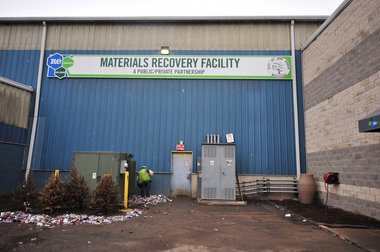ANN ARBOR, MI – The private company that operated Ann Arbor’s recycling plant for the last several years is suing the city.
Resource Recovery Systems LLC and FCR LLC, commonly known as ReCommunity, filed a complaint in federal court on Wednesday, July 27, claiming the city wrongfully terminated its contract.
The company claims the city breached its contract, broke promises and unjustly enriched itself at ReCommunity’s expense through wrongful actions to escape a contract the city believed was no longer financially advantageous.
Additionally, the city’s actions put dozens of employees out of work and created additional burdens for city taxpayers, ReCommunity claims.
City Attorney Stephen Postema said on Wednesday afternoon he hadn’t seen the complaint yet and he has no comment at this time.
City officials have said they terminated the longstanding contract with North Carolina-based ReCommunity, which was in the 20th year of a 26-year agreement, because of poor performance and safety concerns, including fires at the plant.
ReCommunity was under contract to operate and maintain the city’s Materials Recovery Facility, where recyclables are processed, at 4150 Platt Road.
ReCommunity had a contract with Ann Arbor to manage the city’s recycling facility and transfer station since 1993.
The city and the company shared profits from the sale of recyclable materials when revenues exceeded operating costs.
ReCommunity claims the city created an excuse to get out of a contract that was no longer financially advantageous for the city following a downturn in the marketplace for recyclable materials.
“In 2014, when the worldwide price of oil began to decline, sales revenues for recyclables also dropped steadily until reaching all-time sustained lows in 2015,” ReCommunity stated in a press release issued Wednesday.
“The city’s recycling contract included a requirement that the city pay ReCommunity when sale revenues fell short of the amount of ReCommunity’s cost to operate the site. It also included a requirement for the city to reimburse ReCommunity’s costs for the repair and replacement of recycling equipment from a fund that the city knew was insufficient to cover costs of needed repairs.”
ReCommunity claims the city maximized its profits when market prices were up, receiving nearly $3 million since 2011, and then refused to pay required shortfall payments and invest in critical equipment when the market was down.
When City Council members realized last year the city’s costs related to recycling were expected to increase by $1 million, ReCommunity claims the city decided to engage in efforts aimed at escaping the contract and entering into a new one that provided less financial risk and greater financial reward to the city.
“To effect its plan, the city retained a consultant to develop a new contract, continued to default on its payment obligations, refused to invest in critical equipment and initiated a series of inspections designed to find any and all discrepancies to manufacture a basis for terminating the contract,” ReCommunity claims. “Due to the shortfall in the repair fund, ReCommunity was forced to spend over $500,000 in repairs without being reimbursed by the city, including constant work on the old baler which would break down regularly, causing operational issues, employee turnover, and deferred housekeeping.”
After ignoring or rejecting numerous proposals from ReCommunity to work together to find solutions, the city started writing “default letters” to finalize its termination plan, ReCommunity claims.
“Recognizing a weakness in its initial default notice alleging failure to obtain approval for the third-party recyclables that contributed to the city’s revenue share, Ann Arbor then stated that an incurable default existed based on alleged safety violations detected during the daily inspections by the city and its consultants — who were directed to find problems,” ReCommunity claims.
ReCommunity claims it immediately addressed the alleged safety issues and took steps to reduce third-party volumes coming into the facility.
ReCommunity also claims it paid more than $550,000 for a new baler, relying on city assurances that it would pay a portion of the costs.
Instead, ReCommunity claims, on the day that the baler was fully installed and operational at ReCommunity’s sole cost, the city completed the final step of its plan and issued a termination letter.
As the news of the contract termination was announced at a recent City Council meeting, the council voted to approve spending $116,507 for the city’s share of costs for the baler, estimated to cost $582,535 in total.
The 21-page complaint was filed in U.S. District Court. ReCommunity is being represented by attorneys from Honigman, Miller, Schwartz and Cohn LLP.
ReCommunity is seeking to recover all damages associated with the city’s actions, claiming to have suffered lost profits and reputation damages.
ReCommunity claims it had contracts to process third-party recyclable materials at the plant and that it made $1.8 million in revenue-sharing payments to the city since January 2011 from the sale of third-party recyclables.
Due to falling commodity prices, the lawsuit states, revenues per ton recently fell short of the “trigger price” — a threshold of $54 per ton for revenue sharing — shifting the historic flow of payments from ReCommunity to the city in the opposite direction. Due to that shift, ReCommunity claims Ann Arbor owed $183,566 to ReCommunity as of July 2016 and has yet to pay.
“As commodity prices continued to fall, the city began alleging safety violations at the plant and criticizing ReCommunity’s management in a transparent attempt to manufacture a basis for escaping the contract,” the lawsuit states.
“As the monthly net negative amounts continued to accrue, the city caused the fire department and various other inspectors to visit the plant, where they reported purported violations, including such inconsequential issues as dirty lights, cardboard on the ground, and trash on the site.”
On April 21, 2016, owing nearly $250,000, the city sent ReCommunity a letter citing an alleged breach of contract based on the fact that ReCommunity sourced materials from certain third parties, the lawsuit claims.
“Ann Arbor wrongly claimed that it had not approved of these third-party agreements, the tonnages were beyond the plant’s capacity, and the materials were causing safety violations and concerns,” the lawsuit states.
“The city had previously accepted payments from ReCommunity for its share of revenues from these third-party contracts, raising its newfound objections only when faced with its contractual obligations to pay the net negative amounts.”
At last week’s council meeting, City Administrator Howard Lazarus relayed what he characterized as a success story about what’s happening right now while operations at the recycling plant are temporarily disrupted.
“Since the cancelation of the operator’s contract, 100 percent of the recyclables picked up within the city of Ann Arbor have been routing to recycling facilities or stored for routing to recycling facilities for processing,” Lazarus said.
“I know last time I mentioned there may be some material that may temporarily have to go to landfill, but that did not occur.”
Lazarus said city staff will be bringing resolutions to the City Council for approval on Aug. 4 to confirm emergency purchase orders with Waste Management, Royal Oak Recycling and the Western Washtenaw Recycling Authority related to changes in the city’s MRF operations and materials handling.
Lazarus said the city is working with a consultant called CB&I to develop a new contract that is fair and reasonable and has proper incentives for all parties to ensure materials are properly handled. He said the consultant also will be providing a tip-floor throughput analysis of MRF operations.
“Because we believe that the former operator was exceeding plant capacity, and that was the root cause of some of the operational issues,” Lazarus said.
The City Council approved a $121,780 contract with CB&I in January for services related to developing a new MRF contract.
City officials have acknowledged the marketplace for recyclable materials has changed such that the city desired to reexamine the existing business model and contract structure, stating a desire to optimize the financial impact.
Ryan Stanton covers the city beat for The Ann Arbor News. Reach him at [email protected].
Source: www.mlive.com




